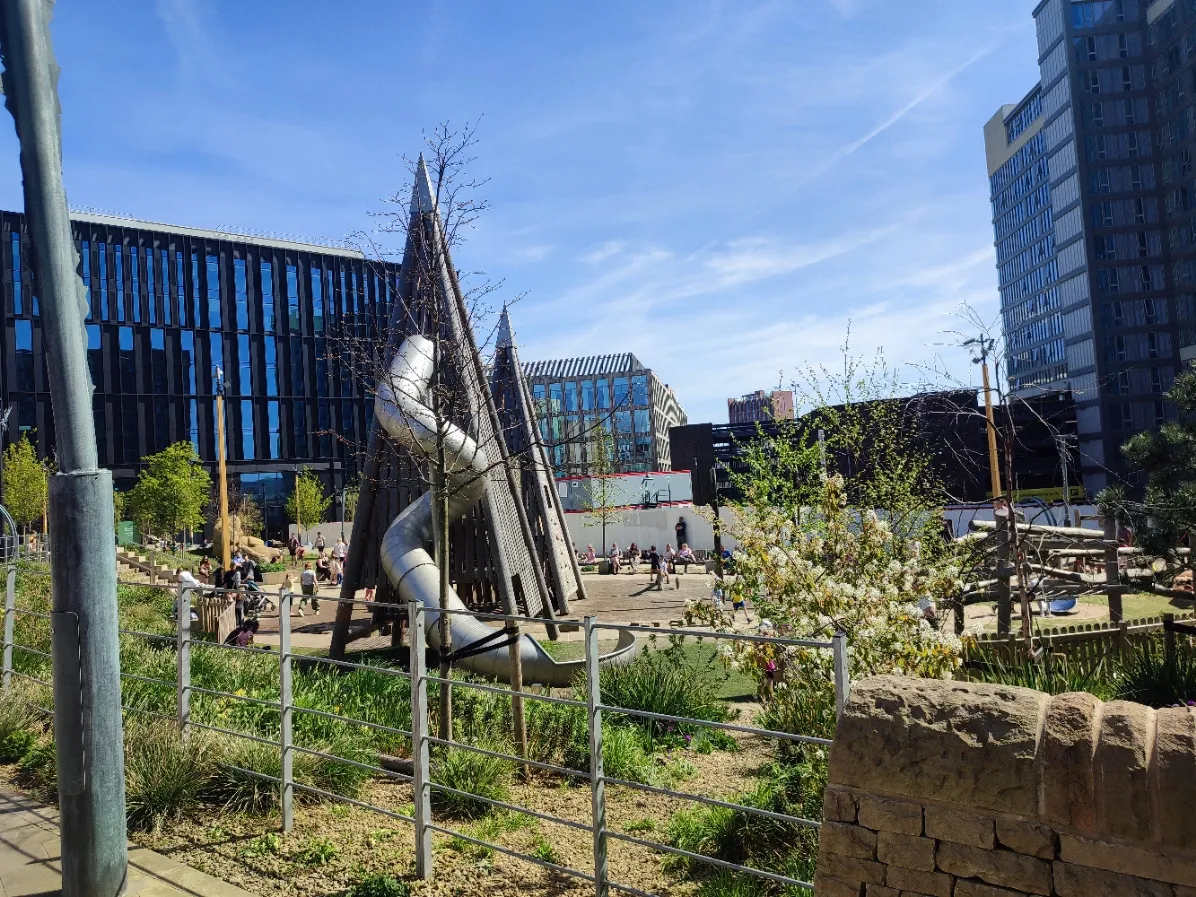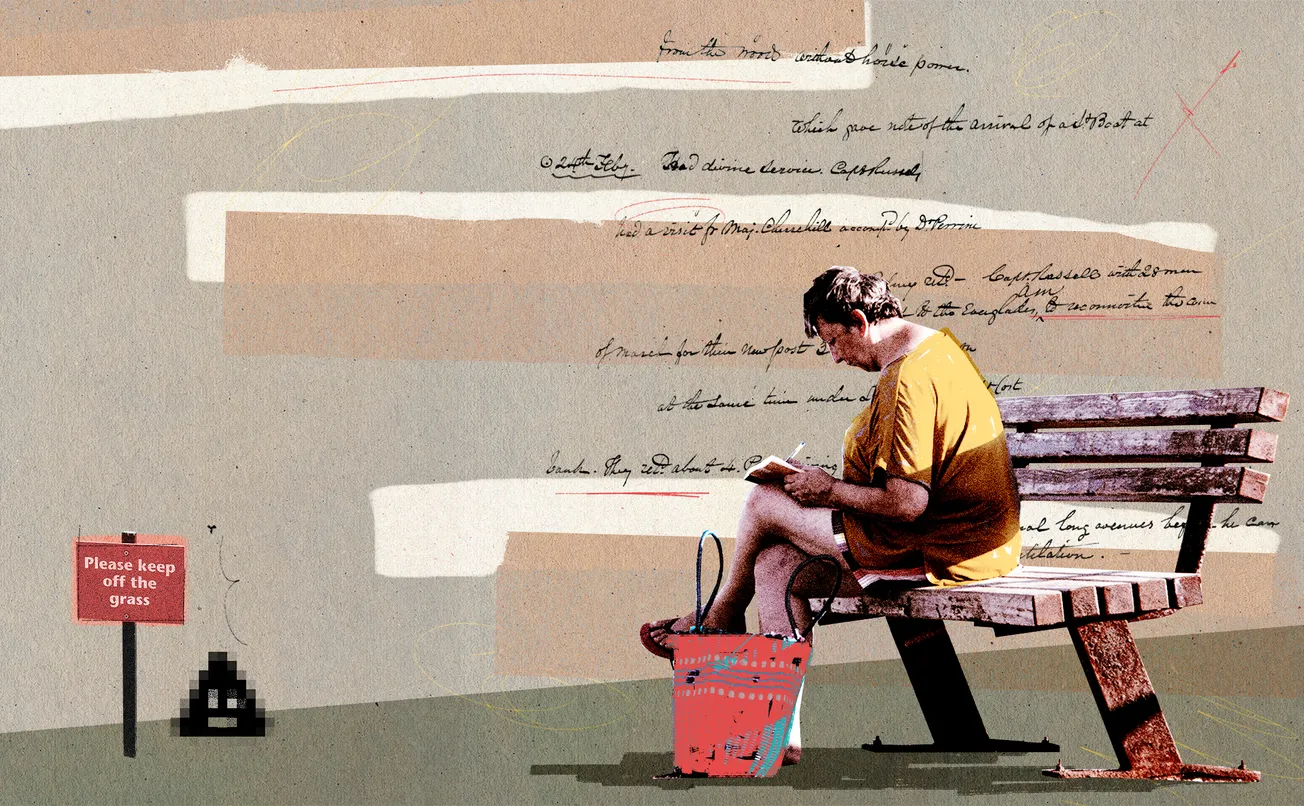Imagine for a moment you’re Deborah Bullivant, a former headteacher and the founder of Rotherham literacy charity Grimm & Co. It’s been eight years since your charity tasked local children with reimagining their town, encouraging them to set their sights as high as possible. What you heard was that they wanted to feel proud of where they’re from — that they don’t want it to forever be associated with scandal and child sexual abuse — so you’ve toiled through a pandemic, several elections and much else besides to help them bring that to fruition.
Now, all your work is about to pay off. This year, Rotherham is the “Children’s Capital of Culture,” a self-appointed title accompanied by a year-long programme of events, supported by millions of pounds in funding from bodies like Arts Council England. The town’s council is leading the charge, while its schools, libraries, museums and a whole host of other organisations are fully behind it. The road here has not been easy — newspapers like the Daily Mail have been quick to point out the irony in their usual sensitive fashion — but the children are so excited.
And then, in the very first days of what should be a year of triumph, Elon Musk fires off a few tweets that rocket Rotherham’s most shameful period right back into the headlines. Suddenly, though it has been more than 10 years since an explosive report revealed 1,400 children had been sexually abused over a 16-year period, it’s being talked about all over again. “The Rotherham story is simple,” begins a lengthy article in The Telegraph, published last month. “It’s a story about cowardice and evil.”
This is not what Bullivant wants Rotherham’s story to be. “Does everyone really want towns to be resigned to their past failings forever?” she wonders. “We will never forget what happened, it’s really important that we don’t, but it’s equally important for this town to be recognised for where it’s going and what it has learned.”
More importantly, “cowardice and evil” is not what Rotherham’s children want the story of their town to be. “They don’t want the place where they live to have a bad reputation,” she says. “The young people who are the next custodians of the town want there to be a new narrative.” In the face of a scandal that affected thousands in some of the most horrific ways imaginable, that was never going to be an easy task, even if Elon Musk hadn’t stuck his oar in. But the alternative — “putting Rotherham in a corner with a label on it” — is unacceptable.
“It’s not ideally how we would want to start the festival year, with these types of narratives in the media,” says Sarah Christie, the council’s programme manager for the project. She seems sanguine about the timing but, like most local people, she’s had ample time to develop a thick skin. “These types of things being said are not unfamiliar to residents in Rotherham,” she points out. In 2015, far-right groups like the English Defence League were demonstrating in the town centre so frequently that the council leader launched an online petition, “Enough is Enough,” urging the government to intervene. “Repeated protests, largely by people from outside the local community, are holding Rotherham back,” Chris Read said at the time.
Christie says it’s been “super positive” to see local adults increasingly keen to push back against negative narratives and support the Children’s Capital of Culture (CCOC) project online. “People want to stand up for what they see is a hugely positive development for the town.” After all, the CCOC is “in part a response” to what happened: “It’s a demonstration of our commitment to empowering young people, keeping them safe and listening to them.”
Over the course of the year, the CCOC project will help fund a wide range of cultural events, although street festivals seem to feature heavily. The first of the year — “Otherham,” which saw children’s stories projected onto local landmarks — was a huge success, attracting more than 15,000 people to the town centre. The year-long programme also incorporates some pre-existing events, such as Ferham Festival, which has been taking place since the 90s. By taking part, these events will be able to benefit from the funding that CCOC has pulled into the borough. A council spokesperson told The Tribune it has already received £5.53 million in funding, with a further £1.1m currently awaiting a decision.
Ferham Festival was an obvious fit for the CCOC, despite not being specifically aimed at children, because it takes place in an area of Rotherham with large Pakistani, Yemeni and Roma communities. There is, Christie notes, an “urgent and important” need to improve racial cohesion in the wake of scandal. In the 2014 report that revealed the scale of the abuse, retired social worker Professor Alexis Jay noted the majority of known abusers “were of Pakistani heritage,” while most of the known victims were white.
Quickly, the media seized on the idea that the authorities had failed to act out of a fear of being deemed racist. When I last visited Rotherham before the general election, one white resident I spoke to said resentment over this idea was still very much festering. “You can see that bubbling under the surface,” he said. “It seems as though they were allowed to do what they wanted.” It’s likely this aspect that caused the scandal to capture Elon Musk’s attention, given his known far-right sympathies.
But it’s important to note that Professor Jay insists this was not the main reason the problem was brushed under the rug. In an interview with the Guardian the year after her damning report, she suggested the Labour-dominated council turned a blind eye “to not rock the boat, to keep a lid on it, to hope it would go away”. Even more importantly, the fact that most known victims are white doesn’t mean the town’s other children were not also abused. Police researcher Dr Angie Heal, who first tried to raise the alarm in 2003 when she wrote a report titled Sexual Exploitation, Drug Use and Drug Dealing: The Current Situation in South Yorkshire, wrote at the time that there were “undoubtedly” Asian, Black and Eastern European children being exploited too. “But this appears to be much more hidden, within families or communities, and rarely gets spoken about.”
The effect the scandal has had on race relations in Rotherham is stark. In August 2015, an 81-year-old Yemeni man Mushin Ahmed was killed by two white men, one of whom shouted “groomer” at him before the attack. A year later, a local mosque received a bomb threat from a neo-Nazi group. Last year, when a mob rioted outside a hotel in Rotherham housing asylum seekers in response to the Southport killings, many of those who took part held signs or shouted abuse referencing the scandal.
According to Christie, Rotherham’s young people made it clear they wanted the festival to help heal this rift by celebrating the various cultures that make up the town. “They’re passionate about equality and diversity,” she says, “it’s something that came up again and again.” Another big focus was the environment: “When we asked the kids what they liked about Rotherham, the thing that came out top was green spaces, and they’re understandably worried about the climate crisis.” This was the impetus behind one of the events directly created by the CCOC project, which had its trial run last year but will return as part of the programme in March, Roots Festival. It’s themed around sustainability and the environment and is what Christie immediately selects as one of the events she is most excited about.
Despite leading the project, Rotherham Council did not dream up the idea of CCOC, although Bullivant is keen to commend their bravery in going for it “rather than accept any kind of resigned attitude to how Rotherham is perceived”. As she points out repeatedly during our chat, it was pitched to the council by local young people. “That’s the motivation and catalyst that makes this different from anything else,” she says. “We don’t give young people enough credit for what they’re capable of.” Of course, no matter how much Bullivant is keen to stress that this was the children’s idea, it’s clear it never would have happened without her.
Bullivant grew up in Sheffield but now lives in Barnsley. She was first brought to Rotherham in 2009 as part of a project called Yorkshire Forward, which received £3m in government funding to boost children’s literacy, with the goal of improving the SAT results for local primary school children by 5% over two years. Bullivant was keen to focus its work on the most deprived communities in the town, particularly children who spoke English as a second language and, after two years, the SAT scores for this group had risen by a whopping 23%. “It was an unprecedented shift, no one had ever seen anything like this,” she says. But then the funding ran out.
She tells me she felt compelled to stick around anyway. “It felt irresponsible not to make it happen, we had seen what a difference it made.” She set up her own company aiming to boost literacy — a social enterprise called Inspire Rotherham — and spent five years developing her ideas and attracting support and volunteers, before finally founding the charity Grimm & Co. Its central premise is that it makes learning how to read and write entertaining for children.
It’s not hard to see why Grimm & Co would be hugely successful at this, given its building alone would capture most children’s attention. After raising funds from bodies like Arts Council England and the South Yorkshire Mayoral Combined Authority — plus a private donation of £175,000 from a local business leader — the charity transformed its latest base, a former church, into a magical apothecary where children are introduced to the “magic” of storytelling. It’s more than a little inspired by the Harry Potter franchise, with the charity even hiring the design team that worked on Harry Potter Studios, although they also involved people who worked on decorating the set for the BBC’s hit TV show Traitors. The renovation was pulled off during the pandemic, despite costs for building work rocketing at that time, and Bullivant initially describes the charity’s success as fortunate before quickly correcting herself. It wasn’t just good luck, it was ambition and bravery.
Because of how quickly the charity blossomed, Bullivant was invited in 2017 to take part in a local partnership of educational and cultural organisations, tasked by the council with creating a strategy for the next few years. She tells me she found the process a little uninspiring at first. “It was starting to look like a funding application, I didn’t think it was something the children and young people of this town would see themselves in,” she says. “I thought surely we should be getting their voices on this.” She asked the local children that her charity already worked with if they wanted to design the strategy instead.
Grimm & Co encouraged the young people to go about it with the charity’s typical focus on whimsy and high production values, creating an “embassy” for their reimagined version of Rotherham in an empty shop and letting them design the space. (This resulted in sand on the floor and chocolate milk for everyone who visited “whether they liked it or not,” Bullivant says.) She then asked the young people to consult with residents, young and old, about what they’d like to see in town. It’s as a result of this work, she says, that the idea for the Children’s Capital of Culture was born.
Bullivant’s enthusiasm is infectious and, after only one phone call with her, it’s not difficult to see she has a talent for getting people on-side — I was certainly left rooting for the success of the project. While the timing of Musk’s fixation on grooming gangs was “unfortunate and a bit random,” she doesn’t seem all that fazed. Not all of the attention they’ve been receiving lately has been so negative.
As a case in point, when we speak, Bullivant apologises if she sounds a bit out of it: she’s been up since 3am preparing for a visit from the Department of Education, hot on the heels of a visit from the Department of Media, Culture and Sport earlier that week. Government officials stopping by is nothing new — she’s received delegations from the governments of Japan and South Korea in the past, keen to learn from her work — but this is the first time our own political leaders have taken this much of an interest in Grimm & Co since it was founded in 2014. “Now, all of a sudden, they’re all coming. It’s been bonkers,” she says.
Perhaps all this government interest is unsurprising, given one of the biggest challenges facing the UK is how to renew its old industrial towns. If Rotherham can do it, many others will be looking to follow suit. One of the best places to start would be speaking to their children.
An earlier version of this article incorrectly described Mushin Ahmed as Pakistani.

Comments
How to comment:
If you are already a member,
click here to sign in
and leave a comment.
If you aren't a member,
sign up here
to be able to leave a comment.
To add your photo, click here to create a profile on Gravatar.







